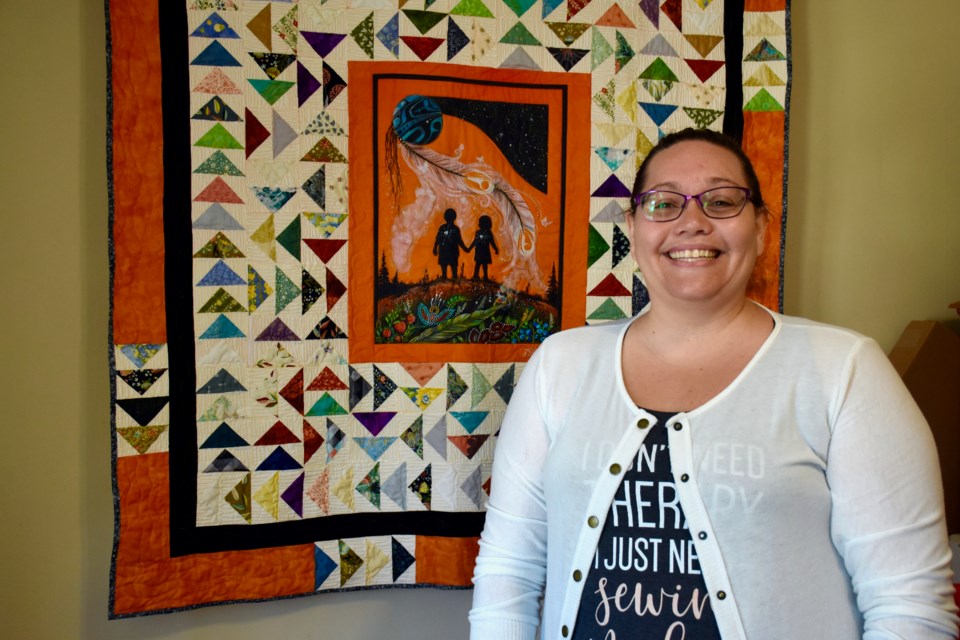An event this weekend is stitching together support for a local project giving comfort to residential school survivors across Canada.
A Quilting Sew-Along Workshop and Gathering with Vanessa Génier of Quilts for Survivors is being held at the Timmins Museum: NEC on Saturday, June 11 from 10 a.m. to 4 p.m.
Participants will make quilt blocks out of pre-cut fabric donated to the project. Those blocks will be used to make quilt tops that will be made into a full blanket and shipped to survivors.
“It would be nice to have five to 10 new sewers, people who have never sewn anything for the project — that would be really nice. We’re going to have survivors there that will share their stories, lunch is provided by the (Ojibway Cree Cultural Centre),” said Génier, a Missanabie Cree First Nation member.
No experience is needed to attend.
“As long as you can sew a straight line and follow some simple instructions, you should be good to go,” she said.
People are asked to donate at least $20 to the project to attend, though Génier said it's not required. If people can't spare extra cash, she said their time is very valuable.
On one of the first hot days of the year, the wind blew through the open windows of the three-bedroom apartment acting as the studio space for Quilts for Survivors. Cut pieces of fabric were knocked from their piles and there was the constant hum of the long-arm sewing machine and the happy chatter of volunteers.
In under a year, the project has exponentially grown from its humble start in Génier's home.
Quilts for Survivors started in June 2021 in the wake of the unmarked graves of 215 Indigenous children being found. As more burial grounds were found across Canada, Génier started Quilts for Survivors to help people dealing with trauma.
With each quilt comprised of 12 different blocks, her initial goal was to make 18 quilts out of 216 blocks to honour the children whose remains were found in Kamloops, B.C.
Her goal was "knocked out of the water in no time", with over 1,600 quilts being completed so far.
“I didn’t even think I would get people to help me make blocks in the beginning. I’m a very optimistic person, but I didn’t want to be too optimistic,” she said.
People from across Canada and around the world have sent finished quilt blocks, and donated fabric and other supplies or money to the initiative.
Quilts for Survivors is now also a non-profit operating out of space on Spruce Street South. Génier said they're working on becoming a registered charity as well.
Génier spends anywhere from 60 to 80 hours a week focused on Quilts for Survivors.
She does the administrative work and keeps the board up-to-date, goes live on social media whenever they get donations — which have slowed down to a couple of times a week from every day. Being a non-profit, she gets paid for 26 hours a week now and aims to be full-time by the middle of this month.
“I work more than I get paid just because there’s so much work to do,” she said.
There are also about 10 consistent volunteers and 20 in total who are active at least once a month.
Quilts are the focus of Génier's project as she's quilted for over three decades. It was a simple idea that didn't cost anything to start and was a way to show respect.
"It’s part of my culture, we’ve always honoured people with quilts whether they’re from our First Nation or they’ve done something for our First Nation and we’ve always presented them with a blanket. These are even more special because they’re handmade and they’re made specifically for survivors with the intent of giving it to them to honour the journey that they had to go through that nobody should have had to live that kind of a childhood,” she said.
What she didn't expect is how the project would help heal the Indigenous and non-Indigenous people who are helping.
"Because they heard the same stories, they’re traumatized hearing that their government and churches did this to children. One lady had said … ‘I hear all the stories, I have my own grief for one — for being ignorant and not being aware, and for two — to realize that those were probably my ancestors that did that to your ancestors.' She said, 'how was I supposed to grieve? Where can I go and grieve?' And she says, now I can make a quilt and now my grief can turn into love and be sent to someone else. So I can’t say it better than what she said,” shared Génier.
A 24-hour residential school crisis line offering support to former students and their families is available at 1-866-925-4419.



